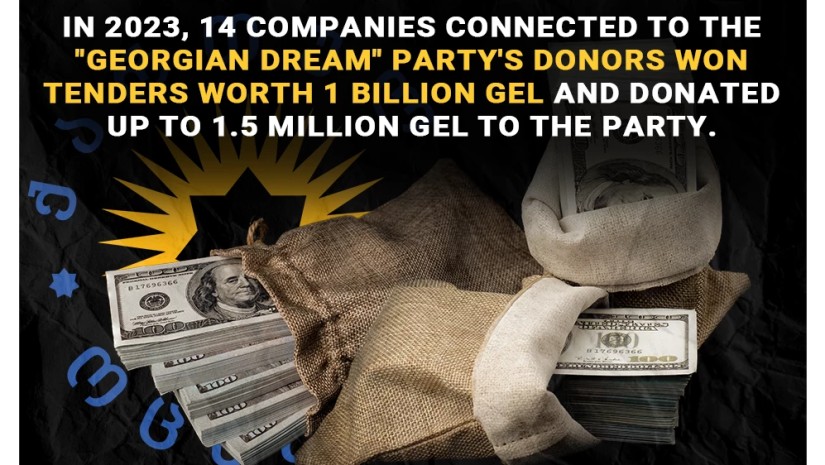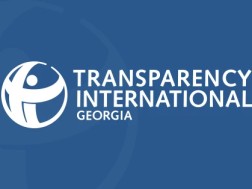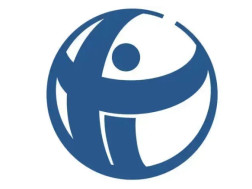As a result of analysis of financial declarations of 2023 submitted by 15 political parties, Transparency International Georgia (TI Georgia) has arrived at the following main findings:
Revenues and expenditures of political parties
* The 15 political parties studied received total revenues of GEL 26,452,373 (budget funding, donations, bank loans) and incurred the expenditures of GEL 14,856,671; 62% of the total revenues of all the parties (GEL 16,315,610) went to the Georgian Dream
* 48% of the total revenues of the political parties (GEL 12,742,941) came from public funding, and 52% (GEL 13,138,636) came from private sources (donations, bank loans)
* 6 of the 15 political parties received a donation of more than GEL 1,000. The parties received donations of GEL 13,138,636 in total
* Georgian Dream received donations exceeding 11 million GEL (85% of total donations). This is a record amount of donations for a non-election year.
* Georgian Dream spent only 5.2 million GEL from the total income of 16.3 million GEL received throughout the year.
Participation of companies connected with donors in public procurements and state programs
* In 2023, tenders were won by 15 companies connected with donors, of which 14 companies were connected with donors of the Georgian Dream and 1 – with the Lelo party;
* In the reporting period, 14 companies connected with the donors of the ruling party won tenders with a value of up to GEL 1.1 billion. During the same period, these companies donated GEL 1.45 million to the Georgian Dream;
* In the period before the grape harvest of 2023, donors connected with wine-producing companies donated up to GEL 1 million to the Georgian Dream;
* Alcohol-producing companies connected with the donors of 2023 have received preferential credits of up to GEL 39 million in the years 2013-2023, while in the years 2021-2023, they have received grape harvest subsidies of more than GEL 30 million.
Donations allegedly made through third persons
* In addition to directors and partners of large business groups, donors of the ruling party are often employees of companies who work in such positions as the financial officer, geologist, mechanic, head of workshop, etc. This raises a doubt that they are fictitious donors, while the real donor is concealed, which is a violation of law.
* The practice of using fictitious donors for donating money to the Georgian Dream was identified in connection with RMG group and Anagi group.
* Doubts about fictitious donation are also raised by donations made by a single group within a brief interval of time, which took place in connection with Lilo Mall LLC, when small interest holders of the company donated large amounts to the ruling party on the same day.
Oversight on political parties
* Since the mandate for the oversight on political parties was granted to the Anti-Corruption Bureau, it has been more difficult to obtain information about the activities for the monitoring of political finance.
* The process of monitoring on cases of direct and indirect funding of parties by the Anti-Corruption Bureau is not transparent, which poses a threat that the Bureau interprets the law unjustifiably broadly and is politically motivated.
* In 4 of the 12 cases forwarded by the Anti-Corruption Bureau to the court in 2023, the court applied a verbal warning as the sanction, in 1 case – the court issued a warning, in 1 case – the administrative proceedings were terminated, while in the remaining 7 cases – the parties were fined, with the total amount of the fine equaling GEL 25,700.
Legislative changes
* Legislative changes of December 2023 made it illegal for legal persons to make a donation to a political party; the changes also decreased the upper limit of expenditures to be incurred by parties during a year. The changes are mostly formal, and they cannot eradicate a large financial inequality between the ruling party and other parties.
Recommendations
* For years now, donations made to the ruling party have been raising a reasonable doubt that these donations are a part of a corrupt scheme related to large public procurement contracts and obtaining benefits from other budget-funded programs. The Anti-Corruption Agency of the State Security Service is obligated to investigate such cases.
* When exercising its powers, the Anti-Corruption Bureau should strictly observe political neutrality, be guided only by the law, and observe the principles of transparency. Observing these preconditions is critical for ensuring a fair electoral environment.
* The Anti-Corruption Bureau should be equipped with relevant investigative powers. To ensure political neutrality, opposition parties should also take part in the appointment of the head of the Bureau.
*The State Audit Office should add a separate form to the annual financial declaration template where parties will indicate the specific origin of the amount (if any) in the “other monetary revenues” category.
* Political parties should do more to raise donations through events and campaigns. In such a case, parties are usually less reliant on a handful of key donors, and the risk of possible corrupt deals is also smaller.























